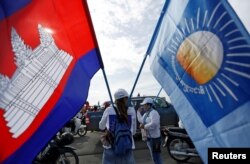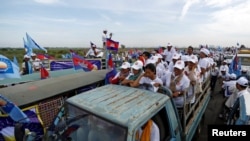In 2001, Cambodian authorities forced Sar Neang and his family from their home in the center of Phnom Penh to make way for a government-backed development.
That experience with Prime Minister Hun Sen's government prompted Neang to embrace politics. He's the current deputy chief of the Khmuonh commune in Sen Sok, a district in the capital that is undergoing rapid growth.
Today, he's campaigning to become commune chief in the closely watched June 4 commune elections. Communes — there are 1,646 — are clusters of villages, and these local votes are expected to offer a preview of 2018's nationwide vote.
Neang, 46, told VOA Khmer that he decided to run as the first candidate from the opposition Cambodia National Rescue Party (CNRP) "because I've seen that people want change."
Second candidate, Meas Rotha and Neang are working to ensure that every eligible Khmuonh resident has the correct voting credentials. Rotha recites the issues upsetting voters — lagging health care and education, the lack of jobs, land grabs, illegal logging and the drug trade.
Sok Thin, 24, a Khmuonh commune resident and a second-year psychology student at the Royal University of Phnom Penh, told VOA Khmer that he hopes his neighbors "cast their vote all together, as via this election … we could change society."
A chance to participate
Like local elections everywhere, the commune elections give ordinary people a chance to participate in the decision-making processes that colors their day-to-day lives. But the Cambodian People's Party (CPP) has resisted the push for local autonomy, earmarking only 2.8 percent of the national budget for communes, according to figures released by the Ministry of Economy and Finance last year.
Cambodia first held commune elections in 2002 after influential donors such as the United Nations and the European Union called for the decentralization of power that Hun Sen had accumulated since 1985.
His ruling CPP dominated the first and second commune votes. But in 2012, although the CPP won 8,292 commune seats, two opposition parties, the Sam Rainsy Party (SRP) — named for the opposition leader who resigned in February after the country's prime minister announced plans for a law that could lead to the party's dissolution — and the Human Rights Party (HRP) won 2,155 and 800 seats respectively. Later that year, the opposition parties united to form the CNRP, which, in 2013 secured 55 of the 123 seats in the National Assembly.
Process is questioned
This year, as opposition to the CPP continues, there have been questions about the voting process.
"A democracy doesn't only mean voting," said Yoeung Sotheara, a legal officer at the Committee for Free and Fair Elections in Cambodia. "Democracy means voting freely, fairly and transparently, and complying with national standards."
CPP spokeman Sok Eysan disputed the opposition's suggestions that there is intimidation and vote-buying, adding, "saying the CPP is buying votes is insulting the people's will."
Free, fair elections are key
Cambodia's bipartisan National Election Committee (NEC) oversees elections, and has updated the voting rolls into digital lists. Depending on the source, 81.47 percent to 95 percent of Cambodia's 9.6 million eligible voters are registered.
Those numbers may suggest a thriving democracy. But, if there is intimidation and vote-buying, if the voting is not free or fair, the commune elections will mean nothing, said Yoeung Sotheara, a legal officer at the Committee for Free and Fair Elections in Cambodia.
Michael Sullivan, the author of Cambodia Votes, a study of the nation's elections, said a free and fair vote simply would not happen. "The system is rigged in favor of the CPP, through control and use of state resources at election time, administrative and bureaucratic malfeasance, control over the media, etc." he said.
Change is improbable
He predicted the CPP is unlikely to lose the June vote.
"First, there would need to be a seismic shift among local voters against the CPP," he told VOA Khmer. "Given the CPP's effective control over rural areas, I don't see this condition being met just yet.
"Second, there would have to be a seismic shift within the CPP allowing for a leveling of the electoral playing field."
Without those shifts, change is improbable, as many view the CPP as a force for stability and economic growth in a nation with a chaotic recent history beginning with the Khmer Rouge takeover in 1975. But the party is also seen as fostering a culture of corruption, by a politically connected elite, who are protected by a judiciary and security forces loyal to the CPP.
Government crackdown
Further fostering a sense of social inequality among voters like Neang, Sok Thin and Rotha, is the government's crackdown on those who speak out on key issues. According to Licadho, the Cambodian human rights organization, the government has imprisioned 27 for speaking out on these issues.
Despite this, Neang stands convinced the issues will influence voters who want change.
Em Sary, a 56-year-old resident of the Khmounh commune is one of those voters. "This commune election is very important for our nation," she told VOA Khmer. "I want drugs eliminated…It exploits my kids and other people's kids. I want this commune to change."






